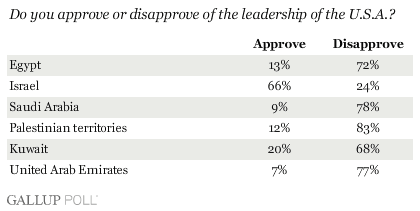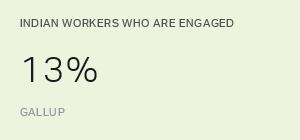WASHINGTON, D.C. -- President George W. Bush concludes his weeklong tour of the Middle East on Wednesday with a brief stop in Egypt to meet with Egyptian President Hosni Mubarak. Some observers say the brevity of the meeting -- reportedly only lasting four hours -- suggests a general cooling in U.S-Egyptian relations as well as an acknowledgement that many Egyptians do not welcome Bush's presence. Several anti-Bush protests took place Monday and Tuesday in Cairo.
Gallup Poll results from six of the seven nations Bush visited in the last week -- Egypt, Saudi Arabia, United Arab Emirates, Palestinian territories, Israel, and Kuwait (Gallup does not have survey data on Bahrain) -- suggest Egyptians likely are not alone in feeling less than hospitable toward the U.S. leader. In two of the countries the president visited, approval of the leadership of the United States does not exceed single digits.
According to a May 2007 survey of Egyptians, only 13% of respondents said they approve of the leadership of the United States, which is similar to the 12% approval rating given by Palestinians in a July 2007 survey. Approval of U.S. leadership drops below 10% among Saudis (9% in May 2007) and respondents in the United Arab Emirates (7% in August 2006). In Kuwait, respondents surveyed in August 2006 were somewhat more positive: 20% of respondents said they approve of U.S. leadership.
The picture is much different in Israel, however: 66% of Israelis surveyed in July/August 2007 said they approve of the leadership of the United States.

Survey Methods
Results are based on face-to-face interviews with approximately 1,000 adults in Egypt, Israel, Saudi Arabia, United Arab Emirates, Kuwait, and Palestinian territories, aged 15 and older, conducted in 2006 and 2007. For results based on the total sample of national adults, one can say with 95% confidence that the maximum margin of sampling error is ±3 percentage points. In addition to sampling error, question wording and practical difficulties in conducting surveys can introduce error or bias into the findings of public opinion polls.